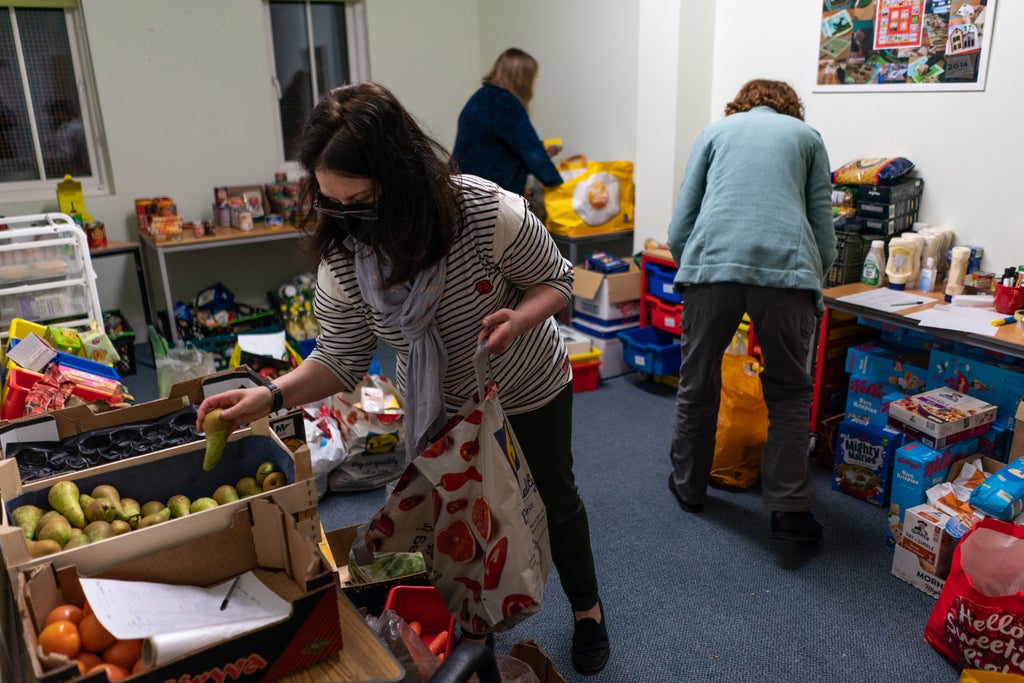
Hospitals across the country have set up food banks and are offering emergency “hardship” loans as health leaders warn staff are “struggling to feed their families”.
Six NHS trusts have set up food banks or launched food voucher schemes for workers as part of efforts to help staff cope with the rising cost of living, while others have confirmed they are considering the move.
Some hospitals have also begun offering emergency loans to help staff who are under financial pressure, while others have increased the payments made to workers in respect of their travel costs.
The Cavell Nurses’ Trust, which supports UK nurses, midwives and healthcare assistants in financial crisis, told The Independent it had seen a 140 per cent rise in the number of people seeking help in the first four months of 2022 compared with the same period in 2021.
Graham Revie, chair of the Royal College of Nursing’s (RCN) Trade Union Committee, said staff were already being left out of pocket by rising fuel prices, adding: “Now we are seeing some struggling to feed their family.”
Professor Alison Leary, chair of healthcare and workforce modelling at London South Bank University, told The Independent: “I’ve been approached by several NHS organisations who are very concerned about the impact of the cost of living on their staff. Some are looking at starting food exchanges or food banks, and others are looking at other ways to help, for example with the costs of transport.”
Kate Jarman, director of corporate affairs at Milton Keynes University Hospital, told The Independent the hospital had set up a community kitchen a couple of months ago to support staff who may be struggling to afford to eat.
“We are also trialling the provision of welfare packs of food, hygiene and other essentials for staff in need to access discreetly at work,” she said, adding: “We will keep talking to our staff about how best we can support them with the increasing cost of living, and do everything we are able to to help.”
One senior source in London, whose trust is planning to launch a food-swap programme, said workers had also asked about clothes banks and clothes swaps.
They added: “We’ve also had an increase in staff who’ve found themselves in a position where they can’t afford rent, and found themselves in the challenging situation of having to move because they can’t afford where they’re living, and not being able to afford to live in London.
“Then their job comes into question because they can’t travel, because that is so expensive. So we’ve seen an increase in staff trying to access hospital accommodation, which is quite limited. There has been a little bit of a push around hospitals trying to keep hold of their staff accommodation.”

Responding to reports, Wes Streeting MP, shadow secretary of state for health and social care, said: “What kind of country have we become under the Conservatives where NHS workers, the heroes of the pandemic who kept us all safe, can’t afford food?
“The government’s response to the cost of living crisis is to cause further pain by raising taxes on working people, including hardworking NHS staff.
“Labour would put up to £600 back in people’s pockets by cutting energy bills, paid for with a windfall tax on oil and gas companies.”
Trusts including Norfolk and Suffolk Foundation Trust, Norfolk Community Health and Care, West Hertfordshire, Dartford and Gravesham have also recently set up staff food banks and food voucher services. Sheffield Teaching Hospitals set up a staff food bank in 2020, and University Hospitals Birmingham has had one for a number of years.
The CEO of a hospital in the Midlands said its hardship loans were already being taken up, and the trust expected demand to rise.
In a board report this month, the Royal United Hospitals Bath Foundation Trust said: “We already know our staff are reaching out for financial support via unions and [the employee assistance programme] and that they are utilising food banks. We also know a number of our nursing staff have already received grants from the Cavell Trust. Therefore it is imperative we take prompt action to support all our staff.”
As part of its support plans, the trust has also committed to maintaining free car parking and providing food bank vouchers.
Mr Revie of the RCN said: “This is an outrageous state of affairs, and a big admission that the NHS knows how its workers are struggling while the government denies them fair pay.”
He added: “Thousands of nurses are leaving the profession every year, with many citing pay as a reason.
“Ministers must take note and recognise the reality for those they relied upon during the pandemic, and deliver a fair pay rise, or even more nursing staff will struggle to meet the cost of living, and the number leaving the profession will continue to grow.”
Danny Mortimer, chief executive of NHS Employers, said: “With inflation hitting a 40-year high and living costs mounting, healthcare leaders are of course doing all they can to help their staff and their families through these difficult times.”
A government spokesperson said: “We are incredibly grateful to all our NHS staff and we recognise the pressures caused by the rising cost of living.”
“We are taking action worth over £22 billion in 2022-23 to help households with the costs of energy and to ensure people keep more of their money – including by cutting fuel duty, raising the threshold at which people start to pay National Insurance and cutting taxes, for the lowest-paid workers on Universal Credit so they can keep more of what they earn.”







